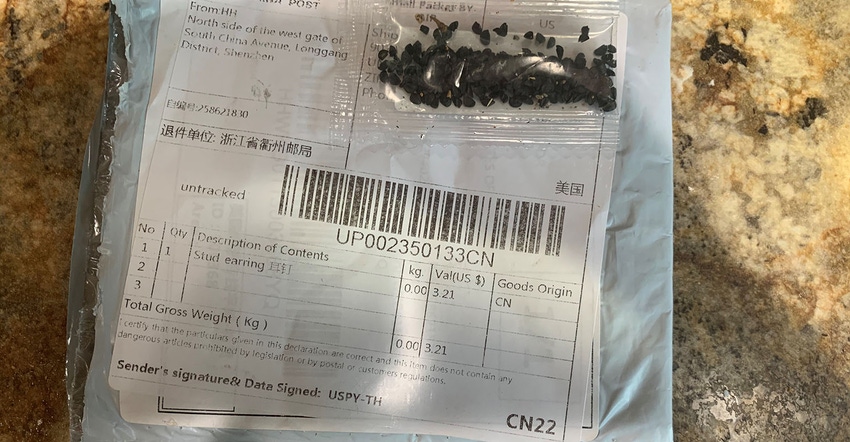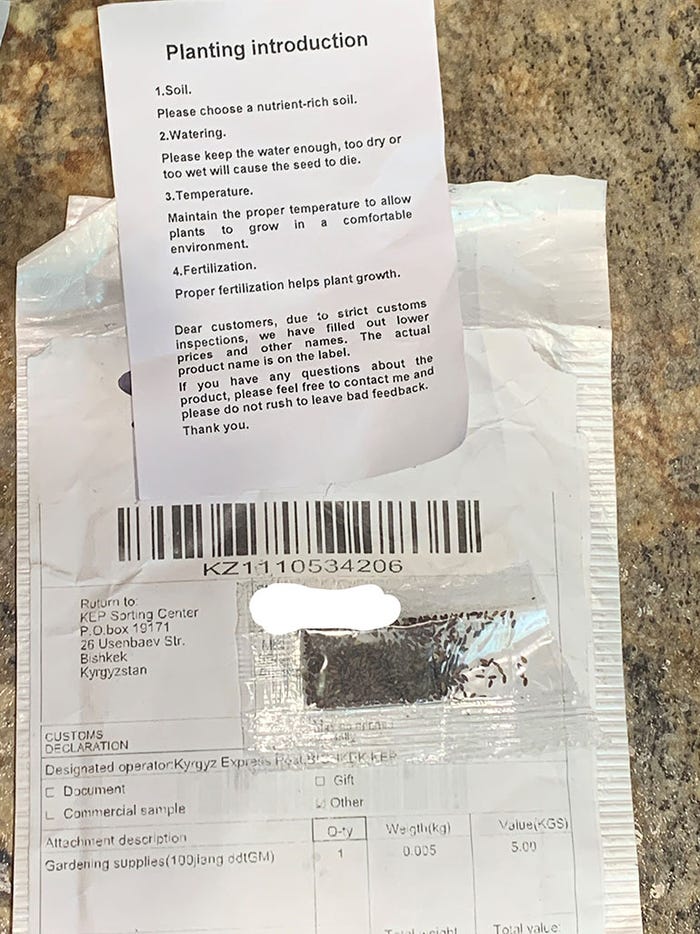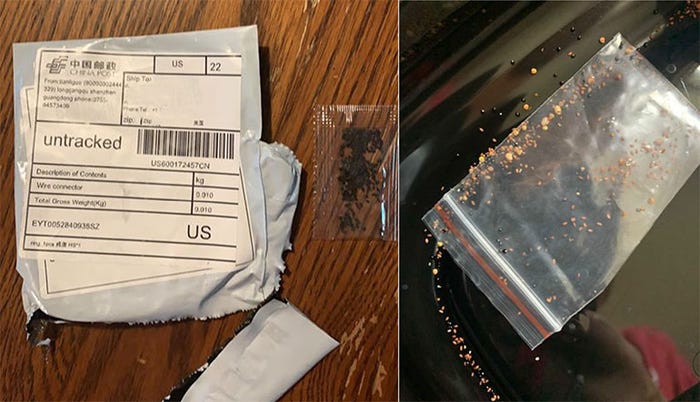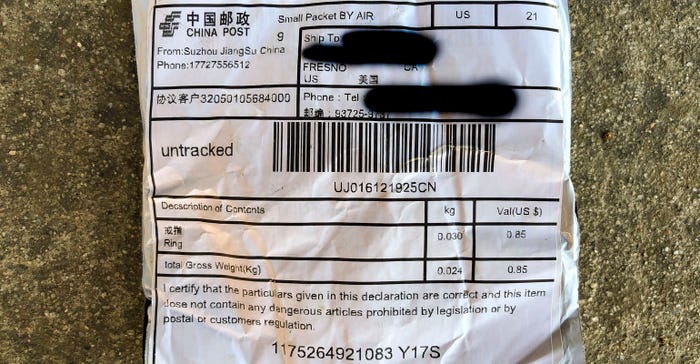Did you get mystery seeds in the mail?
Updated: List of states reporting mystery seeds increases. Don't open the bags. Call your state agriculture department instead.
August 3, 2020

Updated.
Have you received an unsolicited package of seeds in the mail? If so, you're not alone.
Officials in many states, including Minnesota, Michigan, North Dakota, Iowa, Indiana, Ohio, Louisiana, Utah, Virginia, Washington, Kansas, South Carolina, Kentucky, Maryland, North Carolina, California, Arizona, Wisconsin and Delaware, have received reports from residents of unsolicited packages of seeds arriving at their doorsteps. It appears the seeds are from China.
Any person receiving a package of seeds they did not order should avoid planting the seeds and call their state agriculture department or USDA.
“We’re uncertain what these seeds may be and why people are receiving these unsolicited packages,” said Denise Thiede, Minnesota Department of Agriculture’s Seed Unit Supervisor. “Until we know more, we encourage people to contact us because of the risk they may pose to Minnesota agriculture and our natural landscapes.”
One theory being advanced is that this large shipment of packets, which contain seeds but are often labeled as "jewelry" or other items, is part of a "brushing scam" where fraudulent packages are sent to individuals, then the shipper posts fake positive reviews online. However, the extent of this "mailing" has raise suspcions across the country.

Minnesotans should do the following if they have received unsolicited packages of seeds:
Do not throw away the package or its contents.
Do not plant the seeds.
Contact Arrest the Pest line at 1-888-545-6684 or [email protected] and provide your name, contact information, and the date the package was received.
Officials will coordinate shipping the packaging and contents to the MDA Seed Program.
The MDA is working with USDA's Smuggling Interdiction and Trade Compliance Program on identification and destruction of the seeds.
In North Dakota, several reports have been received and residents are encouraged to:
Retain the seeds and packaging, including the mailing label;
Do not plant the seeds;
Contact the North Dakota Department of Agriculture at 701-328-2391 or email your name, phone number and number of packages and dates received to [email protected] to report the incident;
Wait for further instructions.
“We’re not sure why these seeds are being sent or what the motives are behind this,” Agriculture Commissioner Doug Goehring said. “Unsolicited seeds may be invasive and introduce diseases harmful to plants or livestock.”
In Indiana
Anyone in Indiana who receives a package of the mystery seeds is not to open the seed packet and to mail it and any packaging materials to the U.S. Department of Agriculture’s Animal and Plant Health Inspection Service (APHIS) Indiana office.
“It might be tempting to put this into some soil to see what happens, but there’s a lot of damage that can cause,” said Don Robison, seed administrator for the Office of Indiana State Chemist. “We don’t know what these seeds are, and there is potential for doing serious harm to everything from your backyard garden to the commodity and specialty crops that are such an important part of the agricultural economy. The last thing we want is to spread a weed, invasive species or disease, and that’s a real risk if people plant these or throw them in the garbage.”
Anyone who receives unsolicited seeds should:
Keep the seeds and packaging, including the mailing label, but do not open the seed packet;
Place all contents in a zip-top bag, then place the bag in an envelope or small box and mail it to: USDA APHIS PPQ, State Plant Health Director, Nick Johnson, 3059 N. Morton St., Franklin, IN 46131
If you cannot mail the items, do not dispose of them. Keep the seeds, packaging and mailing label and contact the Indiana Department of Natural Resources Division of Entomology & Plant Pathology at 866-663-9684 or [email protected].
Anyone who has already planted seeds should not dispose of the plants or soil. Contact the Indiana DNR Division of Entomology & Plant Pathology at at 866-663-9684 or [email protected].
In Iowa
The Iowa Department of Agriculture and Land Stewardship is asking anyone who receives unlabeled seed from an unknown origin to retain the original packaging and report it immediately at 515-281-5321. Recipients should not open the seed packet, plant the seed or attempt to destroy it.
“The Iowa Department of Agriculture is working closely with the USDA to trace, collect and properly destroy these unknown seeds to protect our agriculture community from plant and seed-borne diseases,” said Iowa Secretary of Agriculture Mike Naig.
In Wisconsin
Wisconsin residents receiving the seeds are asked to fill out an online form. After filling out the online form, hold onto the seeds and packaging, including the mailing label, until DATCP or APHIS contacts you with further instructions.
In Oklahoma
Morgan Vance, spokeswoman at the Oklahoma Department of Agriculture, Food and Forestry, offers these instructions for Oklahoma residents:
If the package has already been opened, place all contents – seeds, envelopes and packing material – in a zip-lock bag, write your name and city on the bag and then send an email to [email protected] with that information.
If the seeds have been planted, they should be dug up and shaken for loose soil before following the previous step.
Once the seeds are secured, they can be disposed in three ways:
Mail the bagged contents in another package to Vance at the Agriculture Department, 2800 N. Lincoln Blvd., Oklahoma City, 73105.
Carry the seeds in person to the front desk at the department.
Bring the materials to a local OSU Extension county office.
In Louisiana
A resident in St. Rose, Louisiana, received the seeds, the state's agriculture department reported. Residents should call 225-925-4733 if they receive the seeds. Louisiana Department of Agriculture and Forestry inspectors will collect the seeds and test them for positive identification.
“Right now, we are uncertain what types of seeds are in the package. Out of caution, we are urging anyone who receives a package that was not ordered by the recipient, to please call the LDAF immediately,” said Commissioner of Agriculture and Forestry Mike Strain, D.V.M. “We need to identify the seeds to ensure they do not pose a risk to Louisiana’s agricultural industry or the environment.”

From California
Fresno County Farm Bureau's chief executive, Ryan Jacobsen, became aware of the deliveries when two different friends contacted him after receiving the unsolicited packages. In both cases Jacobsen said the unopened packages were delivered to the local agriculture departments in the counties in which they were received.
Jacobsen confirmed that bags were delivered to the Merced County Department of Agriculture and the Fresno County Department of Agriculture, but not before taking photographs of one of the bags and providing it to Western Farm Press.

In Arizona
Media reports in Arizona suggest similar deliveries were made in Douglas, a small border town in southeast Arizona.
The Arizona Department of Agriculture urges Arizona residents who receive these packages to immediately send or drop them off, unopened, to one of the following locations:
Arizona Department of Agriculture, Plant Services Division, 1688 W. Adams, Phoenix, AZ 85007
Tucson Operations, Arizona Department of Agriculture, Plant Services Division, 400 W Congress Ste. 124, Tucson, Az. 85701. (P) 520-628-6314 (F) 520-628-6961
Yuma Operations, Arizona Department of Agriculture, Plant Services Division, 1931 S. Arizona Avenue Suite 4, Yuma, AZ 85364, (P) 928-341-1758, (F) 928-341-1750
In Illinois
The Illinois Department of Agriculture is currently working with USDA’s Animal and Plant Health Inspection Service (APHIS) to address reports of unsolicited shipments of seeds from foreign countries.
Anyone who receives unordered seeds in the mail should contact the Illinois Department of Agriculture by emailing the following information to [email protected]:
First and last name,
Phone number
Number of packages received
Do not open the package, plant the seeds, or throw them out. Please keep all seeds unopened and with their original packaging and labels, including mailing labels, until further instruction is provided.
In Washington
The Washington State Department of Agriculture issued a statement late Wednesday, 7/29, asking the public to send any suspicious seeds to USDA-APHIS. In its statement, the agency notes that "mislabeling packages in order to get seeds and other plant materials into the country is agricultural smuggling." the practice bypasses safeguards that prevent invasive species from being established in the country. While the agency notes the shipments may be part of a "brushing" practice designed as an online marketing tool to create fake positive comments, the packages still represent a worry.
WSDA had originally told the public to not open their packages, double bag them and discard them. However, with news that USDA wants those packages sent to APHIS, the agency issued new guidelines. In its media statement, WSDA notes the agency first learned of the shipments on July 24 when two individuals reported receiving seeds they did not order. After posting an alert on social media, the agency "received hundreds of similar reports," WSDA notes.
The agency is requesting people who receive the seeds to send them to:
USDA-APHIS-PPQ - Attn: Jason Allen
Seattle Plant Inspection Station
835 South 192nd Street, Bldg D, Ste 1600
Seatac, WA 98148
Note, a "brushing scam" occurs when people receive unsolicited items from a seller who then posts false customer reviews to boost sales. USDA is currently collecting seed packages from recipients and will test their contents and determine if they contain anything that could be of concern to U.S. agriculture or the environment.
In Arkansas
Arkansas residents who received the seeds should contact Arkansas Plant Industries Division at 501-225-1598, or by email: [email protected] or [email protected].
Cooperative Extension Service agents around the state said residents in their counties have received the seeds and asked agents what they were. Agents have been asked to place any seeds in a zip top plastic bag to send to the Arkansas Agriculture Department.
Some of the packages were marked as containing jewelry. Others had no content description on the outside. Return addresses indicated origins in China, Uzbekistan and Kyrgyzstan.
“These seeds are of unknown species and of unknown origin. We have no idea why or what’s being sent to us,” said Vic Ford, associate vice president-agriculture and natural resources, Arkansas Cooperative Extension Service. “The possibility of introducing an exotic invasive species or disease of common crops is a possibility and we have to take precautions.”
In Mississippi
“If you have received these seeds, please call the Bureau of Plant Industry, and we will send an inspector to your location to pick up the seeds from you," said Mississippi Commissioner of Agriculture and Commerce Andy Gipson. "Please don’t plant the seeds.”
The Bureau of Plant Industry’s phone number is 662-325-3390.
Seeds can also be dropped off at county offices of the Mississippi State University Extension Service. If the package has been opened, place the seeds and any packing materials in a zip-top bag labeled with the recipient’s name, city and phone number.
In Alabama
The Alabama Department of Agriculture and Industries has established an on-line reporting system for Alabama residents who received suspicious seeds they did not order. Visit www.agi.alabama.gov/reportseeds and provide the requested information. At the end of the on-line form, there are directions for consumers on how to store the seeds properly until an ADAI representative contacts them. People should hold onto the seeds and the packaging, including the mailing label, until someone from ADAI contacts them with further instructions.
Related:
Residents in Virginia receiving the seeds are urged to report it to Virginia's Office of Plant Industry Services. Utah residents have also received the seeds. Last week, seeds arrived in the United Kingdom. – Virginia Mercury
Kentucky's agriculture commissioner warned people to be cautious of any unsolicited seeds in their mailbox. – KHOU
We have been notified that people have received unsolicited seed packets that appear to have originated from China. Do not plant the seeds. The types of seeds are unknown and may be harmful. The packages were sent by mail. #KyAg365 pic.twitter.com/CiAtxTkgai
— Commissioner Ryan Quarles (@KYAgCommish) July 27, 2020
More than 30 reports have been filed by people in South Carolina who received the mystery seeds. People are being urged to contact USDA's Animal Plant Health Inspection Service at 800-877-3835 or by email at [email protected]. – WMBF News
About the Author(s)
You May Also Like
.png?width=300&auto=webp&quality=80&disable=upscale)


